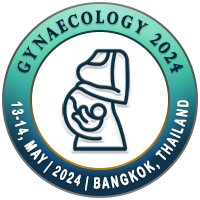
Farzana Sharmin
Bangabandhu Sheikh Mujib Medical University, BangladeshTitle: Polycystic Ovarian Disease-The untold enemy of womanhood
Abstract
PCOS is a complex hormonal disorder affecting women of childbearing age, characterized by increased androgen levels and ovulatory dysfunction. Its causes aren't fully understood, and it has a range of symptoms, including irregular menstruation, difficulty in conceiving, weight gain, unwanted hair growth, acne, and mood changes. Diagnosis involves clinical evaluation, ultrasound, and hormone level testing. Any treatment for PCOS should optimally address not only the ovulatory dysfunction and hyper androgenism, but also the dysmetabolic features such as hyper insulinemic insulin resistance, obesity, dyslipidemia and abnormal clotting mechanism. Hence, the treatment should be for all age groups and depends on their age and needs. Management includes: Lifestyle modification-exercise and diet, drug therapy – Hormones, Insulin sensitizers, symptomatic treatments for acne, hair growth, menstrual dysfunction, surgical management. For menstrual regulation OCP – mostly, beside this Medroxyprogesterone acetate, Micronized progesterone and Cyproterone acetate. Other Drugs which can be used in addition to OCP, Insulin sensitizer: Metformin, Spironolactone and Fenesteride. If Infertility is the issuse for married PCO women then treatment options are:1. Clomiphene Citrate- 1st line of treatment for OI (success rate->80%, Pregnancy rate-40%), 2.Letrozole (associated with low risk of multiple pregnancy,but not recommended), 3.Gonadotropins (Rec FSH/hMGs)-2nd line of treatment(cumulative conception rate-62%, live birth rate-54% after 6 months of treatment), 3.Laparoscopy-LOD- 2nd line of treatment alternative to gonadotropins (less chances of multiple pregnancy and OHSS here), 4.IVF.After completion of family there are still risk for Mature PCOS. Now challenges are- Menstrual irregularities, CVD risk, DM, Malignancy and Psychological issues. For this confirmation of PCOS at an early stage will allow us to prevent dangerous sequle of Mature PCOS. During perimenopause, the risk of diabetes, hypertension, cardiovascular disease, and other health problems increases significantly. PCOS is enigmatic and diagnosis can be tricky. It requires awareness and accurate information for early detection and management.
Biography
Farzana Sharmin completed her MBBS degree from Sir Salimullah Medical College in the year 2000. She did her Post graduate Fellowship (FCPS) in Obstetrics and Gynecology from Bangladesh College of Physicians and Surgeons in the year 2007 at her 31 years age. She is a Fellow of American College of Surgeons from this year. Currently she is working as an Assistant Professor of Department Obstetrics and Gynecology, Bangabandhu Sheikh Mujib Medical University, Dhaka the only Medical University of Bangladesh. She has 26 publications, published in National and International journals. She attended as a participant as well as a speaker in a pretty large number of conferences both in home and abroad.

